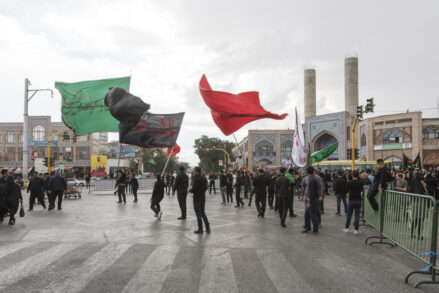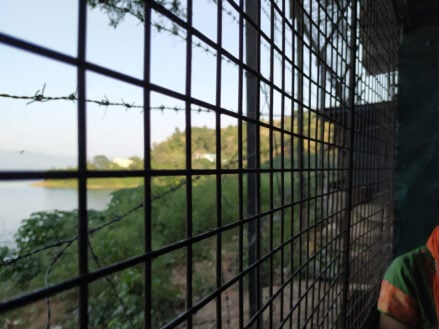It was the bloodiest battle of the Pacific front of World War II, and Desmond Doss didn’t have a gun.
A devout Seventh Day Adventist, Doss was a pacifist who refused to take a life. Doss would run into war zones unarmed, and during one battle alone, he saved an estimated 75 wounded soldiers by dragging them to safety. His story was recently recounted in the movie Hacksaw Ridge.
While Doss’s bravery and conviction are inspiring, it leads to a question—are Christians called to such a radical, some might say reckless, pacifism? For Christians living in the United States, the question is fortunately theoretical, but it’s immediately, painfully relevant for the millions of persecuted Christians around the world wondering, “when is it okay to fight back?”
THE CASE AGAINST PACIFISM
Nigeria is the largest evenly split Muslim/Christian nation in the world. It’s also a place where government help is often non-existent for Christians residing in rural villages. These villagers are subject to repeated attacks by Muslim extremists, and knowing what it means to “turn the other cheek” is getting increasingly difficult as people are attacked and even killed.
“We don’t have the weapons to fight back,” Dalyop Salomon said. Salomon is an attorney representing the families of victims in Nigeria. “If we had them, and there’s a law that warrants us the right to have weapons, we would fight. International bodies should issue a charter or a declaration so that people who can’t enjoy government protection should be allowed to defend themselves by purchasing weapons.”
“We would always be on the defensive side,” Salomon said, because “Christians are always the victims.”
Biblically, there are clear instructions given to Christians on how to live in this world. We’re called to live in peace, to show mercy and—yes—to turn the other cheek. But when Jesus gives these instructions, is He saying a husband can’t defend his wife and children if they’re being attacked?
Romans 13:3-4 grants governments the right to use force to restrain and punish evil.
Paul writes: “For rulers are not a cause of fear for good behavior, but for evil. Do you want to have no fear of authority? Do what is good, and you will have praise from the same; for it is a minister of God to you for good. But if you do what is evil, be afraid; for it does not bear the sword for nothing; for it is a minister of God, an avenger who brings wrath upon the one who practices evil.”
When Paul lived, there was a clear rule of law from an aggressively involved Roman government, although Paul had firsthand knowledge of its injustices. But what should the Christians of Nigeria do when the government that should be protecting them is leaving them to fend for themselves? Do people ever have the right to insist on justice when an ungodly government is perverting that justice?
Especially when considering God’s repeated Old Testament instructions of what just governing should look like, there’s a strong argument to be made that the actions of evil men should be stopped. God loves justice and hates violence and death. If communities of Christians feel the need to create their own “local government” and band together to fight against their enemies, wouldn’t this be just?
THE CASE FOR PACIFISM
In Matthew 26, as Jesus is being arrested, Peter takes out his sword and cuts off the ear of the high priest’s servant. This makes sense. Jesus is about to be unjustly arrested. He’s done nothing wrong and will soon be tortured to death because of trumped up charges and spineless leadership. Jesus knows all of this. Yet He still tells Peter to drop the weapon because “those who live by the sword, will die by the sword.”
This is consistent with everything Jesus said. He was surrounded by political revolutionaries who, citing the barbaric injustices of Rome, called for an uprising of justice. In return, Jesus said, “turn the other cheek.” He said to be peacemakers. Based on how his disciples lived—freely giving their lives as martyrs—it would seem they got the message.
The early church, pre-Constantine, was defined by a pacifism, even as they had every reason to mobilize and fight back against horrifying, systemic persecution. Christians would sing at their executions, pray as they were mauled by lions, and in their deaths, God would bring even more to His Kingdom. Because of this, the early church father Tertullian said, “the blood of the martyrs is the seed of the church.”
As leading pacifist voice John Howard Yoder once said, “Pre-Constantinian Christians had been pacifists, rejecting the violence of army and empire not only because they had no share of power, but because they considered it morally wrong; the post-Constantinian Christians considered imperial violence to be not only morally tolerable but a positive good and a Christian duty.”
FINDING GOD’S VOICE IN THE MIDST OF VIOLENCE
There has been a divide in Christianity regarding pacifism for centuries, and the debate won’t be resolved anytime soon. For those of us living in relative safety, one of our jobs is to pray for our Christian brothers and sisters who are trying to live out their faith in the midst of persecution and hear God’s voice in the midst of violence.
Sometimes, in our shattered world, there aren’t black and white answers. Pray that God would give the persecuted church clarity, wisdom, peace and favor as they attempt to faithfully follow the path of Jesus in the midst of threats, oppression and violence.






